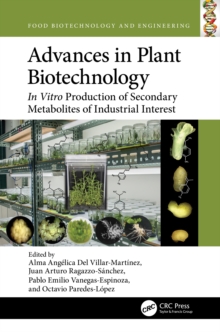
Advances in Plant Biotechnology : In Vitro Production of Secondary Metabolites of Industrial Interest PDF
Edited by Alma Angelica Del Villar-Martinez, Juan Arturo Ragazzo-Sanchez, Pablo Emilio Vanegas-Espinoza, Octavio Paredes-Lopez
Part of the Food Biotechnology and Engineering series
Description
The goal of Advances in Plant Biotechnology is to integrate the most recent knowledge on tissue culture, secondary metabolites production under controlled conditions, scaling up to produce them at bioreactor level, and their industrial applications. The biosynthetic pathways and the factors that affect them and the accumulation of metabolites, including metabolomics in medicinal plants, are key components as well. Several extraction and encapsulation technological procedures are reviewed. The structure and function of metabolites from selected commercial crops are reported in detail. Finally, items of paramount importance, such as bioavailability and stability of metabolites in pharma and food products are deeply analyzed.
Key Features:
- Strategies for obtaining selected metabolites through in vitro culture
- Application of biotechnological and bioengineering principles to the management of plant metabolites
- Description of the encapsulation of selected metabolites
- Bioavailability and stability of metabolites in pharma, food, and industrial sectors
This book is mainly addressed to research scientists, technical staff, and private and public organizations involved in plant biotechnology and in its processing industries. Last, but not least, students at all levels and postdoctoral researchers have received special attention from all editors and authors in this publication.
Information
-
Download - Immediately Available
- Format:PDF
- Pages:278 pages
- Publisher:CRC Press
- Publication Date:31/08/2023
- Category:
- ISBN:9781000923513
Information
-
Download - Immediately Available
- Format:PDF
- Pages:278 pages
- Publisher:CRC Press
- Publication Date:31/08/2023
- Category:
- ISBN:9781000923513










